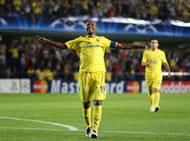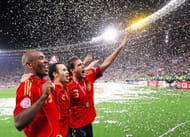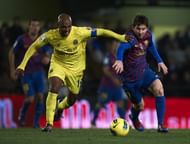
Spain has been blessed with numerous footballers who have graced the beautiful game and left fans in awe, showcase their impeccable technique and creative prowess.
Football academies around the world, such as Barcelona’s La Masia, Real Madrid’s Castilla, Athletic Bilbao’s Canterra, to name a few, have been the hotbed for developing future prospects who have gone on to create a lasting impression. But little did people know that a silent, diminutive midfielder from Brazil would play a vital, yet under-appreciated role in Spain’s Euro 2008 triumph, which ushered La Roja’s golden generation.
While some are remembered for a long period, many have received far less acclaim than deserved. One such player is Brazil-born Marcos Senna who represented Spain on the international stage.
In this piece, we take a look at Senna’s journey from humble beginnings in Brazil to becoming an integral part of Spain’s squad that lifted the 2008 European Championship.
Beginnings
Marcos Senna belonged to a humble Brazilian family in Sao Paolo and faced adversities during his childhood. Like most footballers, Senna used football as a pedestal to improve his family’s fortune. Senna’s father, a daily wage earner, was the only earning member in his family who encouraged his son to continue pursuing football at times when Senna junior thought of quitting the game.
Rio Branco Esporte Club was the launch pad for Senna’s career, where he spent his youth. A series of impressive displays for Rio Branco and America SP saw him get his breakthrough when Brazilian powerhouse Corinthians snapped him up in 1999.
Senna’s time with Corinthians was a short, yet successful one where he tasted silverware for the first time, winning the Brazilian Serie A, Campeonato Paulista and the FIFA Club World Cup, 2000. The Spaniard enjoyed spells at Juventude and Sao Caetano, where his performances were rewarded with a move to Spanish club Villarreal for a modest fee of €600,000.
Stint with Villarreal
The 2002 transfer window saw Villarreal secure the services of Senna after failing in their attempt to sign Brazilian midfielder Gilberto Silva with the latter signing for Arsenal.
“It’s not so important what people think when you join a club, it’s much more important what people think when you leave the club.” - Jurgen Klopp (Manager, Liverpool FC)

As football fans, we’ve sometimes underestimated the calibre of players who make slow starts to their football careers and only realise their importance when the team experiences a rough patch or the player leaves the club. A slow starter, Senna took time adjusting to the pace, physicality and other technical aspects of European football. But as Senna got used to the technicalities of the European game, his individual performances started to improve.
Villarreal finished 8th and 7th in the 2002/03 and 2003/04 seasons respectively, which saw Chilean manager Manuel Pellegrini replace outgoing Benito Floro. It was under Pellegrini that Senna realised his true potential which led to Villarreal finishing third in the Chilean’s first season in charge.
Operating as a holding midfielder, Senna kept things solid at the back and held his team’s shape with his positioning and impressive tackling ability. The anchorman also aided his side’s attack with his impressive passing range and outstanding shooting ability. This gave the likes of Juan Roman Riquelme, Juan Pablo Sorin and Diego Forlan freedom to dictate proceedings higher up the pitch.
Senna played a central role in Villarreal’s European run in 2005/06 by protecting the back four, keeping things disciplined at the back. His fabulous showing throughout the season saw him become Villarreal’s captain, earning him a place in Spain’s 2006 World Cup squad. The Spaniard spent seven more seasons with Villarreal and left for the MLS after making 363 appearances, scoring 33 times.
Senna joined Villarreal as a youngster from Brazil looking to make a name for himself and left the club as a legend thus proving current Liverpool boss Jurgen Klopp right by laying emphasis on the fact that it's much more important what the fans think when a player leaves the club. On several occasions, players who cost less can go on to create a lasting impact towards the later part of their career.
The Catalyst in Spain’s EURO ’08 triumph

Spain’s outing in the 2006 FIFA World Cup ended in disappointment after suffering defeat at the hands of France in the Round of 16. But, it was the 2008 European Championship, which marked the beginning of Spain’s domination on the world stage.
After being granted Spanish citizenship in 2006, Senna was named by Luis Aragones in Spain’s 23-man squad that would travel to Austria and Switzerland for the Euros. Similar to his role with Villarreal, Senna formed a midfield trio with FC Barcelona’s Xavi and Andres Iniesta. He shielded Spain’s defence, regained possession on countless occasions and orchestrated a number of counter-attacking moves with his passing ability. Senna’s assured presence gave the likes of Xavi, Iniesta and David Silva full liberty to bomb forward and create a plethora of opportunities.
One of Senna’s best performances in the Euros came in the final against Germany where he played a major role in neutralising Die Mannschaft’s attackers like Bastian Schweinsteiger, Miroslav Klose and Lukas Podolski. Senna’s positive display had earned him plaudits from many of his teammates and he ended the tournament with a winners medal and a place in UEFA’s ‘Team of the Tournament’. He was also felicitated with the Don Balon award in 2008 for his performances that helped Spain end their 44-year trophy drought.
Speaking of his performances, David Silva said, “He gives us the balance we need and does a dirty job.” Spanish captain Iker Casillas added, “He does a fantastic job for us and is a wonderful guy. We know his importance.” These reveal the sheer brilliance of Senna who did all the ‘dirty work’ to facilitate his side to play some breathtaking attacking football.
The subsequent years saw Senna suffer from several niggling injuries which limited his game time for both club and country. Senna narrowly missed out on a spot in Spain’s World Cup winning squad in 2010 to Sergio Busquets with the former making 28 appearances for Spain before retiring in 2010.

As Spain entered an era of global domination starting from the 2008 EURO triumph and ending with the 2012 European Championship, the names of Xavi and Iniesta have become famous in footballing folklore, entertaining the world with their intricate and efficient brand of football with some really underrated figures slipping under the radar. The prime example of one such player is Marcos Senna who didn’t receive enough recognition from the fans.
While most of the credits go to the attacking players who mesmerize people, one must equally appreciate the work of players who perform the task of preventing the opposition from inflicting damage, thereby adding to the team’s stability. Marcos Senna is a towering example of a player who sadly hasn’t received enough credit for his role in ending Spain’s trophy drought.
“Simple, yet effective.” is a phrase that perfectly describes Spain’s forgotten midfield general.
